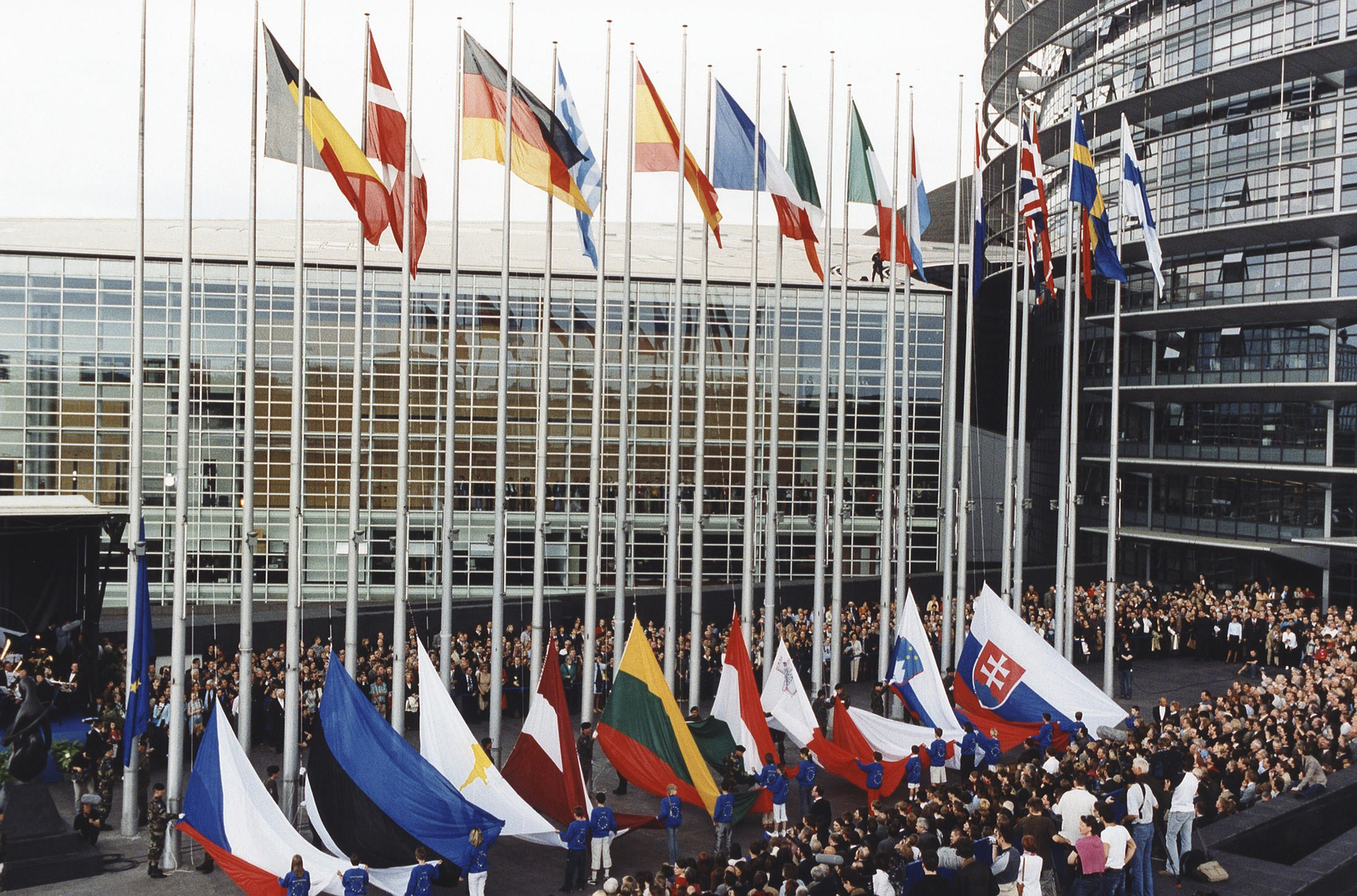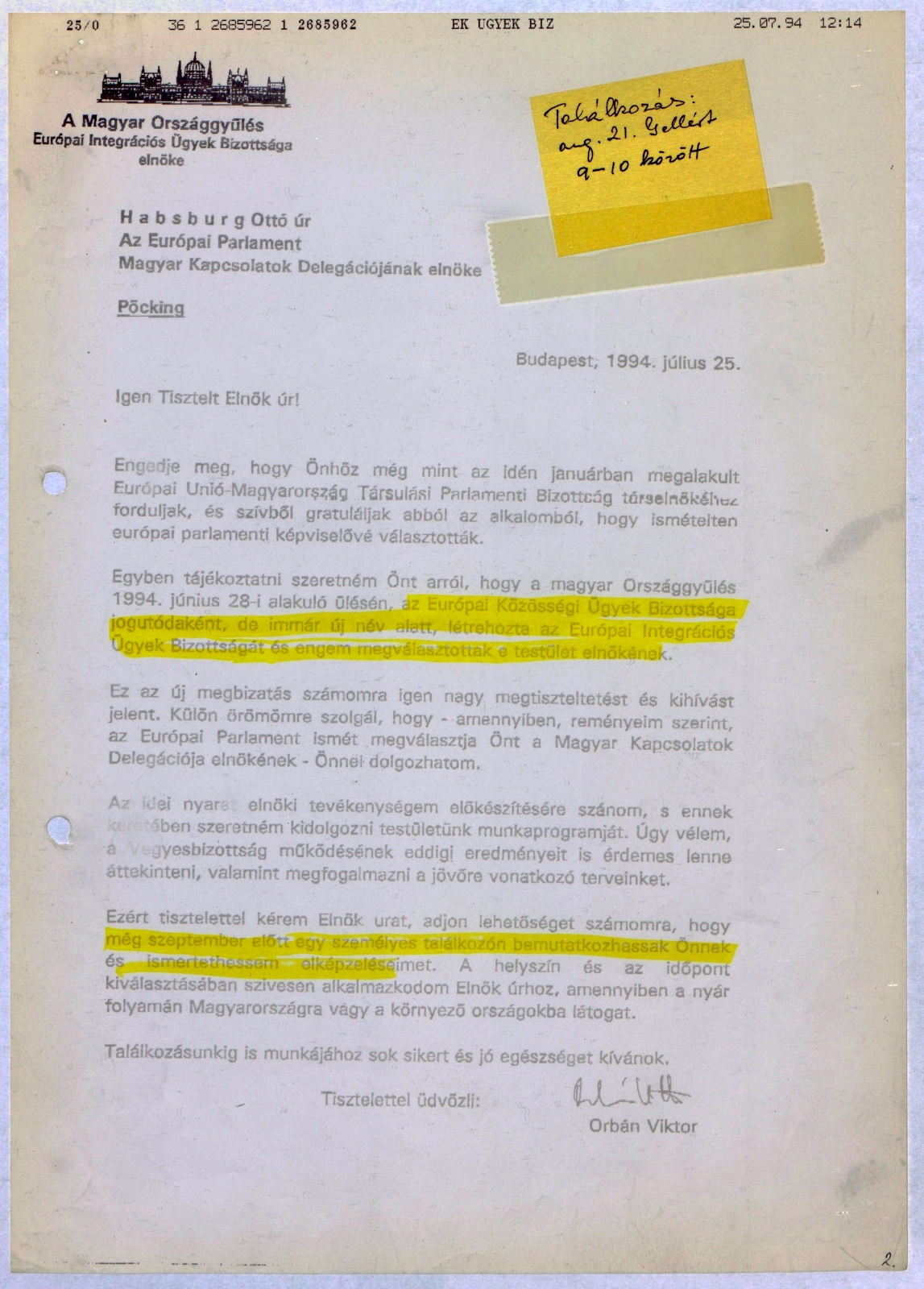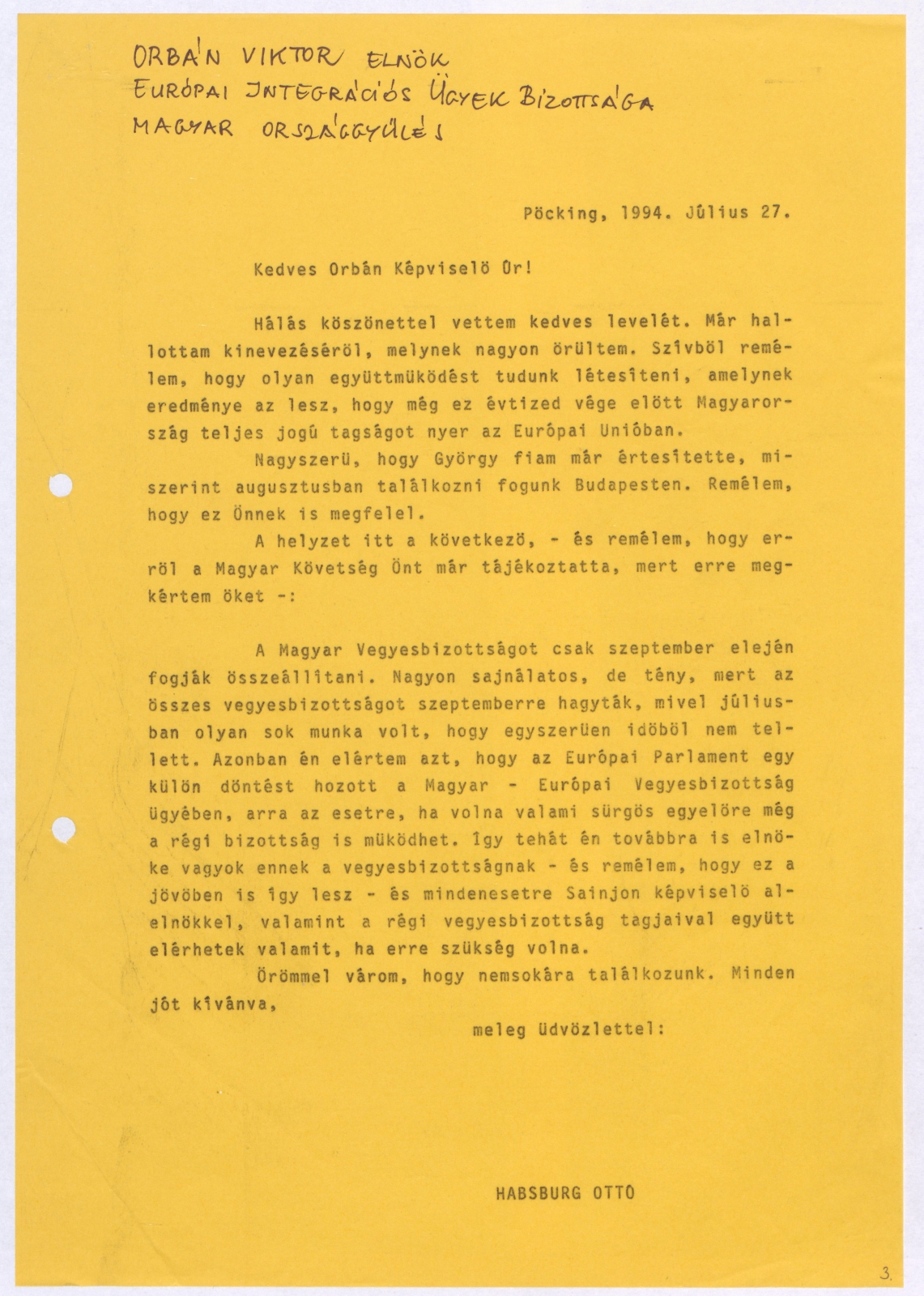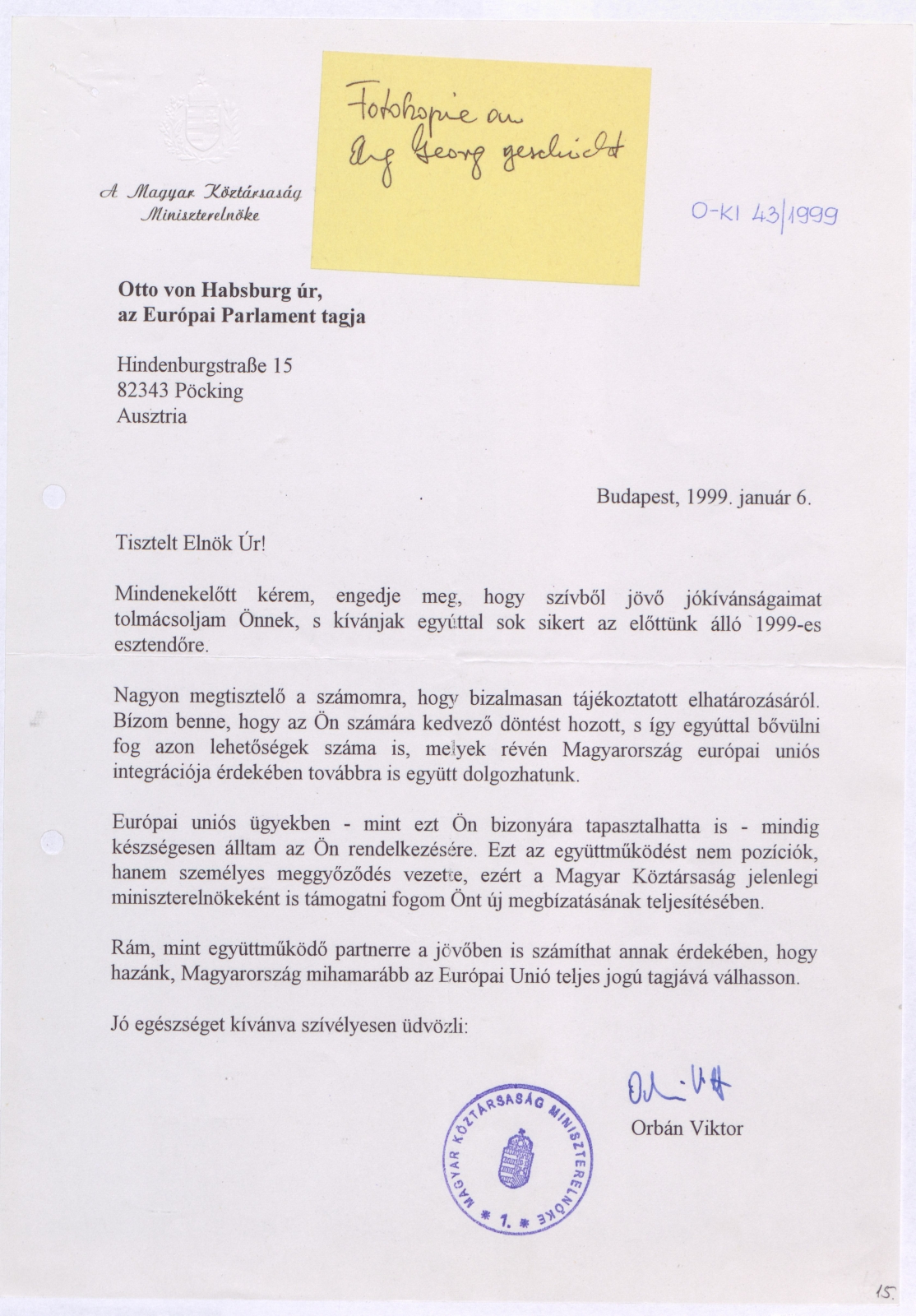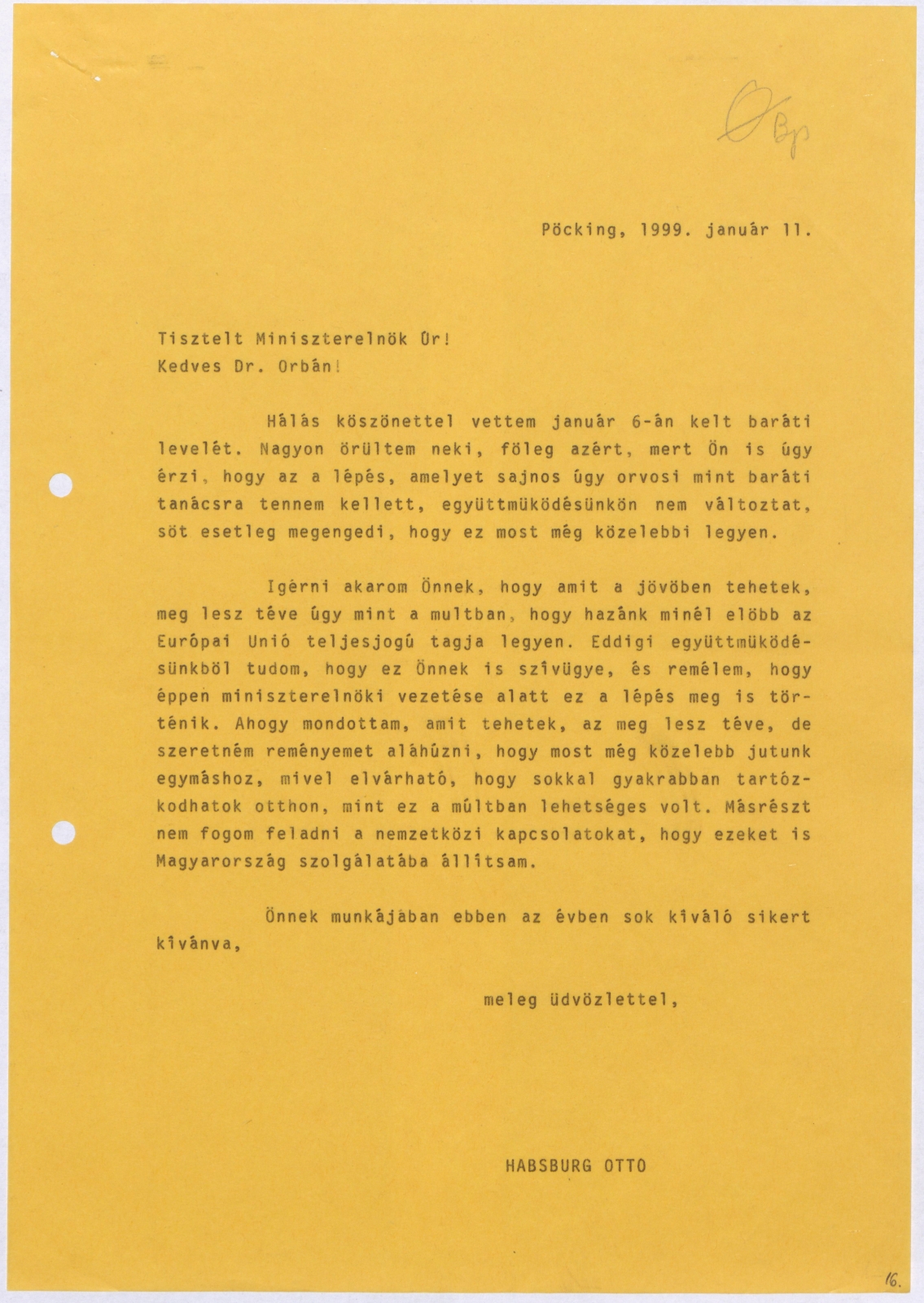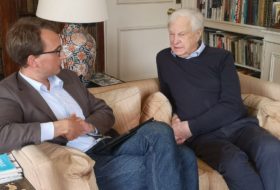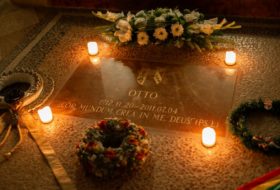Flag-raising ceremony. Welcoming the 10 new member states to the European Union. Strasbourg, 2004
(Photo: European Parliament, Multimedia Centre)
The former heir to the throne believed that by joining the EU, Hungary would be able to re-integrate into Western civilisation, to which it had always belonged. No other option even occurred to Otto von Habsburg. As a member of the Pan-European Movement, which he had been President of since 1973, and as Member of the European Parliament from 1979 to 1999 as a politician of the Bavarian CSU, he frequently spoke out for Hungary. Even before the fall of the Iron Curtain, he had addressed the Hemicycle in Strasbourg several times in Hungarian, expressing his conviction that “there is a language and a nation which should rightly have its place in the ranks of this European Parliament.”[1] The former heir to the throne followed closely the preparations of Hungary for the accession to the EU, as Vice-Chairman of the European Parliament’s Delegation for relations with the countries of Estern Europe from 1987 to 1989. In this capacity, he played a role in enabling Hungary to establish diplomatic relations with the European Economic Community on 26 September 1988, the first of the Eastern Bloc countries to do so.[2] Re-elected in the summer of 1989, Otto von Habsburg was Chairman of the European Parliament’s Delegation for relations with Hungary until 1994, and then, during the last five years of his mandate, until 1999, he served as Chairman and then Vice-Chairman of the joint body of the Interparliamentary Committee of the European Union and the European Union Committee of the Hungarian Parliament (Delegation to the EU-Hungary Joint Parliamentary Committee).
In October 1989, the former Crown Prince was in Strasbourg and Brussels, campaigning for financial support for Poland and Hungary. We quote from his notes at the time: “In my opinion, it is scandalous that we are currently allocating aid amounting to EUA 12.5 billion to the African, Caribbean and Pacific countries that fall under the Lomé Convention, while the bureaucracy objects to even 300 million to Hungary and Poland combined.”[3]
It certainly seemed to Otto that there was no other reassuring alternative for the Carpathian Basin than Euro-Atlantic integration. In 1999 he called Hungary’s accession to NATO a crucial and indispensable step. This is what he said in the Hungarian press about the event 25 years ago: “This development is very advantageous for us, and I was very pleased with the wisdom of the Hungarian people to vote in favour of it by such a large majority in the referendum.”[4]
He had always been a tireless advocate for the integration of the countries of our region into Europe. He had repeatedly expressed dissatisfaction with the fact that EU accession had been progressing slower than anticipated due to the reluctance of the old member states, and was pleased when negotiations were finally successfully concluded in 2002. He was also able to establish close cooperation with the Committee on European Integration Affairs of the Hungarian Parliament (the legal successor of the Committee on European Community Affairs), which had been founded on 28 June 1994 and chaired by the future Prime Minister Viktor Orbán. The Hungarian politician notified Otto von Habsburg of the appointment in a letter, expressing his hope that the former Crown Prince would be re-elected by the European Parliament in 1994 as the Chairman of the Delegation for relations with Hungary and that they could work together in the future. This wish came to reality. [5] Otto von Habsburg had the opportunity to serve one more term and support Hungary’s accession to the EU. Official meetings and exchanges of letters were a regular part of the process, in which, among others, Enikő Győri, later Ambassador and Member of the European Parliament, played an important role as the Secretary of the Committee on European Integration Affairs of the Hungarian National Assembly. In 1998, Otto von Habsburg sent a letter to Viktor Orbán, by then Prime Minister of Hungary, informing him that he would not be running for another mandate in the European Parliament at the age of 86, on the advice of his doctors. In 1999 he wrote to the head of the goverment: “I want to promise you that I will do everything in my capacity in the future, as I have done in the past, to ensure that our country becomes a full member of the European Union as soon as possible. I know from our past cooperation that this is a matter close to your heart as well, and I hope that under your term as Prime Minister this will come to pass.”[6]
The former heir to the throne was aware of Hungarian concerns rooted in the historical past, but always sought to allay them. Whenever it was raised in any forum that the preservation of national identity and freedom in Hungary, a country that had just attained independence, could be threatened by EU accession, Otto von Habsburg was firm in his disagreement: “I do not believe that joining the European Union will diminish the national identity of the new member states. I do not think it is realistic because, first of all, I know Hungarian émigrés. The majority have kept their Hungarian identity. There are, of course, others who have lost it. This is understandable, as our language is not easy, and if you speak English for a long time, it is easier to speak English than Hungarian. There is another reason as well: our language is a citadel. If we look back at history, we were the only nation that survived among the nations that came from Asia, precisely because we kept our culture and settled in Europe – we owe this to King St Stephen. Hungary had belonged to the West from the very beginning, and it endured despite the fact that our nation had been torn apart many times and few Hungarians had been left. There were hardly any people of pure Hungarian origin remaining, but we assimilated others. Neither was Kossuth entirely Hungarian, having Slavic roots, nor was Sándor Petőfi, who was also of Slavic origin. This demonstrates that we shall have faith in the future.”
Otto von Habsburg attached particular importance to Hungary’s entry into the European Union with well-prepared representatives. In March 2003, he addressed the President of the Hungarian Parliament, Katalin Szili, with the following words: “if needed, I could offer advice in personal conversations with future Members of the European Parliament, which might be of value. I make this suggestion because I strongly believe that Hungarians could have a great say in the European Parliament in the future, and I want to ensure that we do our utmost to make this a reality. In this regard, perhaps the best example is 19 November last year, when, thank God, our MEPs were outstanding in terms of their entry into the European Parliament and stood their ground very well, while the Czechs, unfortunately, did not do quite as well, something that is still talked about today.[7]
In the first months of 2004, Otto von Habsburg visited several Hungarian towns and villages, where he made important statements and gave advice on the accession to the European Union, some of which are still worth considering today. First and foremost, he repeatedly stressed that the most crucial benefit of joining the EU is that it provided security. In his view, belonging to a community of 400 million people brings adequate protection. He underlined the importance of EU membership when faced with external threats, especially given the proximity of Russia, a country that could be unpredictable and prone to dictatorship. A recurring thread in his speeches was: “accession is not an economic but a security issue.”
|
Otto von Habsburg: The Austro-Hungarian Monarchy and the European Union, 1997 |
He often referred to his view that the culture of the Hungarian nation of 15 million could be maintained and strengthened by “blurring” the borders, as there was no real prospect of altering them. “By joining the EU, the unity of the nation can be achieved. After the catastrophic events of Trianon, Hungarians may once again form a cohesive community, and the Danube basin shall become united again (…)[9] He stated many times that “Hungary is the heart of the Danube basin. However, this comes with a responsibility, not just pride.”[10] The former heir to the throne issued the latter statement referring to the role of Hungarians in helping their “historic partners”, the Croats and Romanians, to enter the EU as well.
Upon the accession to the EU, the advice of Otto von Habsburg was that the new member states had to place emphasis on learning foreign languages. Delivering a speech in Székesfehérvár in May 2004, as Hungary’s first European Parliament elections were approaching, he said: “I propose that we elect politicians who speak several languages. Based on my twenty-five years of experience, a person who is able to communicate with everyone, will be treated by each individual as a «fellow countryman» and will find it much easier to represent Hungary’s interests.”[11] Nevertheless, he added that “we must be patriots, but above all Hungarians, because if you are not a good Hungarian, you cannot be a good European.”[12]
In 2004, the 92-year-old former Crown Prince made no secret of the fact that there would be difficulties after accession, but he believed that EU membership would bring about the advancement of Hungary in the long term. He also warned that “Hungaro-pessimism should not get hold of the nation, as history has already proven that there exists no power that could extinguish the Hungarian spirit”. This became the motto of his many public speeches of this period: “let us finally give up our Hungaropessimism and be courageously optimistic and hopeful.”[13]
This encouragement should be borne in mind today, twenty years after our entry into the EU, as well as the above revived remarks and advices of Otto von Habsburg from two decades ago.
Gergely Fejérdy
[1] Otto von Habsburg Foundation, Otto von Habsburg Collection, HOAL I-2-c-Bánó Attila , Pöcking, 17 July 1995 (Otto von Habsburg’s answers to Attila Bánó for the Hungarian weekly news magazine Reform.)
[2] Baier, Stefan – Demmerle, Eva: Habsburg Ottó élete. Európa, Budapest, 2003, p. 450, 452
[3] Ibid. p. 468
[4] „Én vagyok a magyar ügyek előadója.” Tapolcai beszélgetés Habsburg Ottóval. (“I Am the Spokesperson for Hungarian Affairs.” Conversation with Otto von Habsburg in Tapolca.) Déli Hírlap, 25 March 1999
[5] HOAL I-2-c-Orbán Viktor, Budapest, 25 July 1994
[6] Ibid.: Pöcking, 11 January 1999
[7] HOAL I-2-c-Szili Katalin, Pöcking, 27 March 2003
[8] Rákosi Gusztáv: Kis folyósokon nagy dolgok dőlnek el. Habsburg Ottó, a Páneurópai Unió elnöke Paksra látogatott. (Gusztáv Rákosi: Great Decisions Are Made in Narrow Corridors. Otto von Habsburg, President of the Pan-European Union, Visited Paks.) Tolnai Népújság, 26 January 2004, p. 5
[9] Magyarország – a hadak útjának közepe, Kárpát-medence szíve. (Hungary – In the Heart of the Carpathian Basin, at the Crossroads of Armed Forces.) Hídlap, 27
January 2004, p. 4
[10] Nagy Márta: „Felelősség a Duna-medencében.” (Márta Nagy: “Responsibility in the Danube Basin.”) Kisalföld, 29 April 2004, p. 9
[11] A nyelv mindenekelőtt. Habsburg Ottó 25 éve dolgozik az Európai Parlamentben. (Language above all. Otto von Habsburg has been working in the European Parliament for 25 years.) Fejér Megyei Hírlap, 27 May 2004, p. 4
[12] Magyarország – a hadak útjának közepe, Kárpát-medence szíve. (Hungary – In the Heart of the Carpathian Basin, at the Crossroads of Armed Forces.) Hídlap, 27
January 2004, p. 4
[13] Habsburg Ottó szerint szakítani kéne hungaropesszimizmusunkkal. (According to Otto von Habsburg, We Should Put Hungaro-pessimism Behind Us.) Aszódi Tükör, 1 February 2004, p. 4
